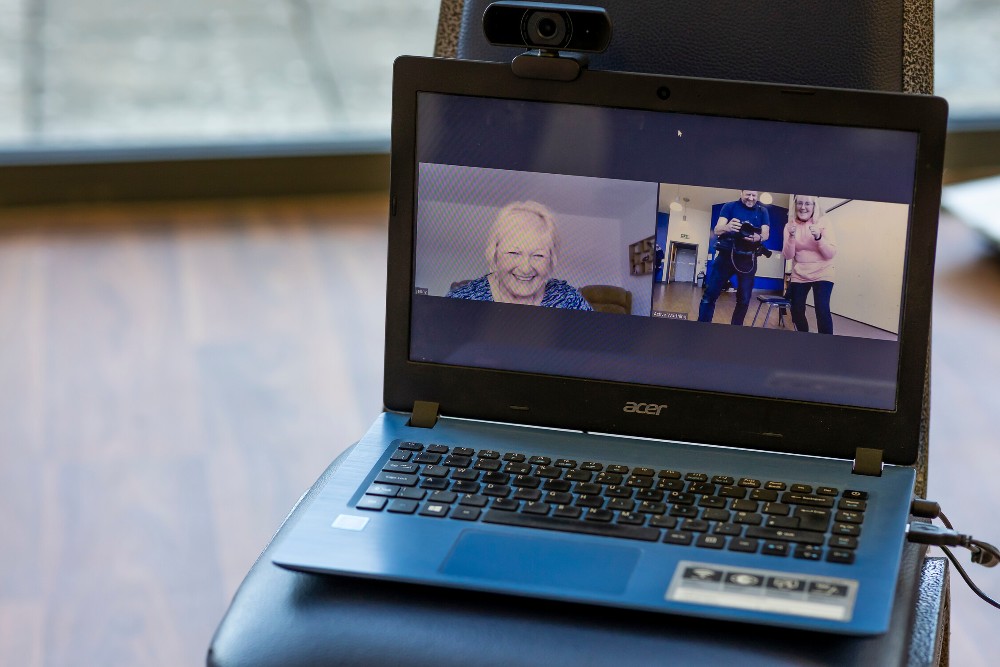 AbilityNet has partnered with Broadband Genie, a consumer comparison site for broadband, to highlight the importance of connecting elderly people online to help combat loneliness.
AbilityNet has partnered with Broadband Genie, a consumer comparison site for broadband, to highlight the importance of connecting elderly people online to help combat loneliness.
According to a survey conducted by Broadband Genie* in January with more than 1000 people in the UK over 65 years old, two fifths (41%) of the UK’s pensioners say they are reliant on their internet connection to stay in touch with loved ones.
A fifth (20%) admit to feeling lonelier during the winter months, and a further 39% of those surveyed say they depend on the internet for entertainment.
Loneliness at its peak in the winter
The research reveals how internet usage is increasing among older people as a means to prevent them from becoming isolated, as a third (35%) of over 65s polled say they spend more time on their own during this colder time of the year.
And almost half (46%) of over 75s surveyed admit they spend at least five hours a day in front of their TVs for comfort.
Birmingham is the loneliest location
Results from the survey show that the loneliest location for pensioners in the UK is Birmingham, where more than a quarter of older people (26%) report feeling more isolated in the colder months, with 32% saying that they spend more time alone during this season.
 Sarah Brain (pictured), Free Services Manager at AbilityNet comments:
Sarah Brain (pictured), Free Services Manager at AbilityNet comments:
“In today's digital era, a significant portion of life unfolds online. Research indicates that older people, compared to other age groups, are less likely to engage regularly with digital devices or the internet.
“Elderly people in Birmingham were revealed to feel the most isolated in winter. The city is an area of focus for AbilityNet and our Senior Skills Digital Training, in collaboration with BT Group.
“As a charity we are committed to ensuring everyone can access technology. Our experience has revealed that older individuals facing digital exclusion—those who seldom or never go online—often grapple with a combination of low confidence, low skills, and a lack of motivation, and this is true for those with and without affordability issues.
“It is crucial to provide those who wish to learn with access to reliable, trusted sources of support and information. AbilityNet's helpline and dedicated volunteers are ready to assist older individuals in enhancing their digital skills. By doing so, we aim to simplify day-to-day tasks, foster easier connectivity with friends and family, and keep them abreast of the latest news and entertainment.”
 Free webinar: Digital discovery: your guide to the online world with BT Group and Amazon
Free webinar: Digital discovery: your guide to the online world with BT Group and AmazonEnjoy a digitally connected life in your guide to becoming tech savvy in your senior years - or at any age. Learn about how digital devices can help, not hinder, your life experiences, including using Amazon Alexa and Echo devices.
If you work for an organisation that helps older people, the resources we share in the webinar can also be used to help clients you support, so bring along a group!
Join a FREE webinar on Wednesday 28 February 2024 between 1pm - 2pm GMT.
Register for the webinarFree digital support available
With results showing that a third of over 65s (32%) spend more than three hours on a laptop or computer every day and 69% use social media as a way to keep themselves occupied, it's not necessarily surprising that landlines are now being used less than in previous years.
Six-out-of-ten (61%) of over 65s polled report that they no longer use a landline, and 37% use it less than an hour a day.
 With changes to landlines being rolled out across the country in the coming years, it will become more important for all to have a working broadband connection. A key issue to address as part of this change is to ensure that elderly people are taught digital skills to use the internet effectively to meet their needs.
With changes to landlines being rolled out across the country in the coming years, it will become more important for all to have a working broadband connection. A key issue to address as part of this change is to ensure that elderly people are taught digital skills to use the internet effectively to meet their needs.
While reliance on internet connectivity becomes increasingly vital for the wellbeing of older people, over three quarters (78%) of British pensioners are still unaware of social tariffs to help get them connected, despite many being eligible for the savings.
One of AbilityNet's charity activities is to provide free support to older people to boost digital skills and offer help with devices, so do get in contact to find out how our dedicated Tech Volunteers (like Jordan pictured, right) can help you or your loved ones.
Internet is a powerful antidote to isolation
Alex Tofts, streaming expert at Broadband Genie, comments: “The need to keep older generations connected cannot be overstated as so many use the internet to keep in touch with loved ones.
“Loneliness among seniors is a pressing concern, with profound implications for mental and emotional well-being. For many, the internet serves as a bridge to social interactions, virtual communities, and diverse forms of entertainment.
“By promoting accessibility through broadband social tariffs, providers empower the elderly to stay engaged, connected, and remain active participants in the digital age.
“The partnership between Broadband Genie and AbilityNet recognises that the internet has the potential to be a powerful antidote to social isolation. Ensuring older consumers have the confidence and skills to go online is crucial.
“Another barrier to connectivity is the cost, which is why Broadband Genie is calling on broadband providers to actively sign up more eligible pensioners to affordable social tariffs.”
How can I get help developing digital skills?

If you're over 65 years of age and looking to build your skills, we're offering free digital skills sessions in areas in and around London, Birmingham, Manchester, Glasgow, Edinburgh, and Cardiff.
Trainers can build something bespoke for your group or for an individual and run sessions including:
- Getting to know your Smartphone or Tablet
- Staying Safer Online
- Getting started with Email
- Using Social Media, e.g. Facebook
- Online entertainment, e.g. watching TV online
- How to access Public Services e.g. Gov.UK
- How to make a video call
- How to manage your health online
- How to bank online
Attend a free session
If you live in another area in the UK, get in touch and we can link you with one of our 450+ Tech Volunteers around the country.
How to boost your online skills: free learner factsheetsMake the most out of life in a digital world using this range of factsheets and other resources build online skills and confidence.
Download your factsheets
How AbilityNet can help
*Broadband Genie research into streaming habits conducted by Censuswide from 10th to 15th January 2024 using a survey of 1,010 respondents aged 65+ weighted to be nationally representative.
**Please note: calls to our helpline number cost no more than a national rate call to an 01 or 02 number and count towards any inclusive minutes in the same way as 01 and 02 calls, and AbilityNet does not receive any money from these calls.
